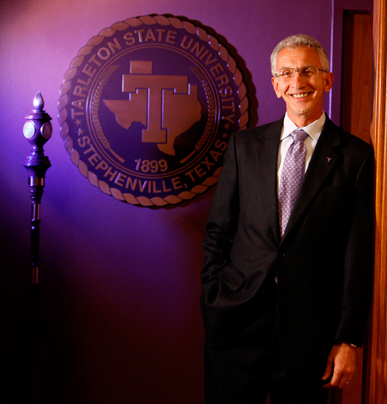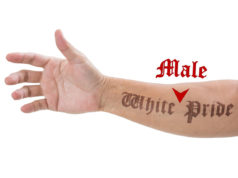Since last month’s cancellation of a controversial play depicting a gay Christlike character, Tarleton State University has maintained that the production was stopped because of concerns for student safety and academic integrity.
Now another picture of what may have happened behind the scenes has begun to emerge.
 The president of a Republican organization claims that Gov. Rick Perry and Lt. Gov. David Dewhurst were instrumental in the play’s termination. Both Perry’s office and Tarleton President Dominic Dottavio have said no such pressure was applied.
The president of a Republican organization claims that Gov. Rick Perry and Lt. Gov. David Dewhurst were instrumental in the play’s termination. Both Perry’s office and Tarleton President Dominic Dottavio have said no such pressure was applied.
However, records released this week show that, in the hours leading up to the cancellation decision, Dottavio received five calls on his cell phone from top officials in the Texas A&M University System, of which Tarleton is a part. Last week, a spokesperson for Dewhurst said that the lieutenant governor’s chief of staff had contacted the A&M system staff “to get some background information on the play.”
Shortly after the cancellation, the play’s student producer, John Jordan Otte, told a Dallas newspaper that “jobs were threatened.” He later said that his comment to a Dallas Voice reporter wasn’t intended for publication and that he had no “factual knowledge” that anyone on campus was threatened with firing. But Otte also said that the university ”bowed down to extremists.”
Records reflecting the calls — but not their content — were released by the university in response to a request by the Texan News Service under the state’s open records law. The calls, totaling 35 minutes, were placed between 4:29 and 8:15 p.m. on March 26, the day Terrence McNally’s controversial play, Corpus Christi, was canceled. According to one person present, who asked not to be named, university officials met for about an hour during that same period to discuss the fate of the play, scheduled for performance the following morning.
Dottavio reports to A&M system Chancellor Dr. Michael McKinney, who, records show, placed one of the phone calls. McKinney reports to the A&M Board of Regents, whose members are appointed by the governor.
Dottavio said he had no contact from the state’s chief executives about the play. “I can tell you unequivocally, I have not had any conversations with the lieutenant governor,” he said. “Nobody from the capital called me … to weigh in their opinion on this issue.”
But Dr. Steven Hotze, president of Conservative Republicans of Texas, has claimed that Perry’s “behind-the-scenes work” was responsible for halting the play. In a note posted on political blogger Norman Adams’ web site, Hotze said the governor and his chief of staff killed the production.
“We also owe a debt of gratitude to Gov. Perry for his behind-the-scenes work to stop the play at Tarleton State,” Hotze wrote. “Ray Sullivan, the governor’s chief of staff, was notified of the play on Thursday, and after discussing it with the governor, the necessary steps were taken to ensure that its performance was canceled.”
Hotze did not respond to repeated requests for an interview.
Tarleton theater professor Mark Holtorf also disputed Hotze’s contention that the governor played any role in his decision. The university has said the decision to cancel the play was Holtorf’s alone.
“Gov. Perry did not affect my decision, and Lt. Gov. Dewhurst did not weigh in on my decision to cancel the play,” Holtorf said. “I am confused by what is being said. It was my decision.”
Sullivan declined to comment. Perry’s office said that the governor had no involvement.
“The decision to cancel the play was the university’s, and the governor didn’t have anything to do with it,” said Perry spokeswoman Lucy Nashed. She also referred questions about the posting to Adams.
The blogger himself seemed convinced that top state officials did play a role.
“Of course Perry and Dewhurst had something to do with it, but I don’t know what steps were taken,” Adams told the Texan News Service. He is the co-founder of Texans for Sensible Immigration Policy and founding director of Citizens Against Lawsuit Abuse.
The posting, headlined “Tarleton State University Hosts Hate Speech Against Christians, Play Canceled,” remained available on Adams’ web site Tuesday.
Adams said that Hotze and others were “thanking Dewhurst and Perry for whatever assistance they lent in helping to cancel the play. I assume when the university received all of the e-mails from certain people they decided to cancel it.
“You should ask the head of the university,” Adams said. ”They know what happened.”
Dottavio said the university was not politically coerced into canceling the play. “That did not happen,” he said.
Tarleton spokeswoman Liza Benedict said Hotze’s claims are not credible. “They are just trying to create trouble and keep this thing going,” Benedict said, “We never once spoke to the lieutenant governor or the governor. They had nothing to do with the professor’s decision to cancel the play.”
The telephone records show Dottavio received a nine-minute call from McKinney; two calls, of four and two minutes, from Janet Smalley, McKinney’s chief of staff; a 10-minute call from Stanton Calvert, A&M’s vice chancellor of government relations; and a 10-minute call from general counsel of the Texas A&M system, Andrew Strong.
McKinney said he would not disclose the nature of his call to Dottavio because “It was between me and one of my presidents.”
Smalley also declined to discuss the nature of her calls, due, she said, to the A&M system policy “when dealing with news agencies.” She referred all questions to Jason Cook, system vice president of marketing and communications.
Neither Calvert, Strong, nor Cook could be reached for comment.
The day before the play was canceled, Dewhurst denounced the production as blasphemous. “Every citizen is entitled to the freedom of speech, but no one should have the right to use government funds or institutions to portray acts that are morally reprehensible to the vast majority of Americans,” he said in a statement that his office distributed online.
Dewhurst’s spokesperson Rich Parsons said last week that “Once the play reached a national level, our office received many calls about the play, and chief of staff Blaine Brunson contacted the A&M staff to get some background information on the play, but the lieutenant governor did not contact Tarleton.”
The play was denounced by some religious leaders and others as blasphemous and sparked calls for protests on the Tarleton campus. The in-person protests, however, failed to materialize after the play was canceled.
The university was flooded by e-mails protesting the play, most of them generated by social networking sites and an online petition. Many of the e-mails repeated the same short message: “Blasphemy is not free speech. Cancel the play.”
University officials said thousands of e-mails about the play went to Dottavio, Holtorf, and others. The Texan News Service has requested copies of some of those e-mails. The university has said it would cost $2,627.50 to make those records available.
Tarleton has also suspended student journalists’ access to its YouTube channel. Students had used the channel to post Texan TV News newscasts, including stories about the play and its aftermath. Officials said they were suspending access to the channel until policies governing its use can be promulgated. They later authorized the posting of a two-week-old news broadcast.
The university also temporarily suspended journalism students’ access to post Texan News Service print stories on the university web site but lifted that ban for the remainder of the semester.
The Texan News Service can be contacted at texannews@tarleton.edu.
(Editor’s note: The Weekly doesn’t usually run wire service stories but made an exception for this one, from a news service operated by Tarleton State University’s journalism and broadcasting students.)











